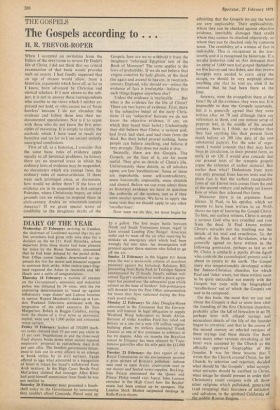DIARY OF THE YEAR
Wednesday 17 February: arriving in London, the chairman of Lockheed warned that his sir- line customers had given only nine days for a decision on the RB 211. Rudi Dutschke, whose departure from these shores had been planned for today by the Home Secretary, announced that he had been delayed by the postal strike. Post Office union leaders determined to ap- proach the TUC for moral and financial support to continue their strike. After twelve years Eng- land regained the Ashes in Australia and Mr Heath sent a cable of congratulation.
Thursday 18 February: a motion of censure on the Government's economic and industrial policy was defeated by 34 votes, with the PM expressing determination to `stand up against inflationary wage claims' and Labour benches in uproar. Rupert Murdoch's shake-up at Lon- don Weekend Television continued with the resignation of the chief executive Dr Tom Margcrison. Rebels in Reggio Calabria, rioting over the choice of a rival town as provincial capital, were met by 1,000 police and armoured troop carriers.
Friday 19 February: leaders of 350,000 teach- ers today reduced their 35 per cent pay claim to 15 per cent. Negotiations to end the three-week Ford dispute broke down when unions rejected employers' proposal to redistribute their 8-10 per cent offer. The Swedish government threat- ened to lock out its army officers in an attempt to break strikes by its civil servants. Egypt offered to sign what amounted to a recognition of Israel in return for Israel's withdrawal from Arab territory. In the High Court Beatie Paul McCartney claimed that manager Allen Klein had paid himself commission from funds he was not entitled to.
Saturday 20 February: BOAC presented a bomb- shell today to the Government by announcing they couldn't afford Concorde. Petrol went up
fp a gallon. The first major battle between North and South Vietnamese troops raged in Laos around Landing Zinc Ranger. American
radio and TV went off the air after receiving by mistake an emergency alert which had, been
wrongly fed into telex. An investigation will proceed against those stations who failed to go off the air.
Sunday 21 February: in the biggest TUC demo since the war a seven-mile column of marchers
protested against the industrial Relations Bill, proceeding from Hyde Park to Trafalgar Square accompanied by 23 bands. Israel's cabinet wel- comed Egypt's readiness to reach a peace agree- ment but pointed out 'the substantial gaps which existed on the issue of borders'. Sub-postmasters will demand from the Post Office compensation for losses they have sustained during the five- week postal strike.
Monday 22 February: Sir Alec Douglas-Home announced in the Commons that the Govern- ment will honour its legal obligation to supply Westland Wasp helicopters to, South Africa. Because of strike troubles Ford has ruled out Britain as a site for a new £30 million engine-
building plant. PO strikers nominated Frank Cousins as one of five nominees to arbitrate in
the Po dispute. After six months the Brazilian consul to Uruguay has been released by Tuna- moaros guerrillas after his wife paid the £12,000 ransom.
Tuesday 23 February: the first report of the Royal Commission on the environment painted a grim picture of Britain's pollution: inshore seas used as open drains, countryside used as car dumps and' fouled water-supplies, Bucking- ham Palace announced the the Queen and Prince Philip would visit Japan. John Lennon revealed in the High Court how the Beatles' assets had been soaked up by spongers. The London Stock Market suspended dealings in Rolls-Royce shares.


































 Previous page
Previous page